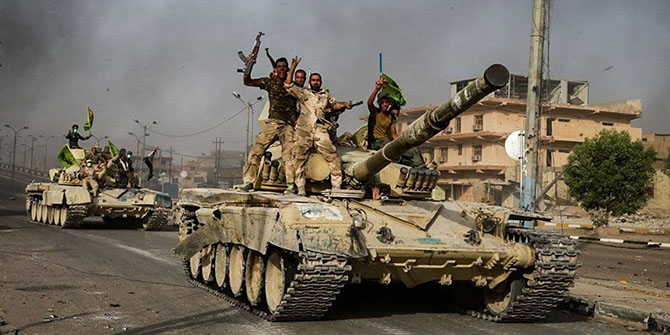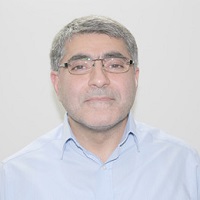by Hayder al-Khafaji

Popular Mobilization Forces following the battle of Fallujah, © Tasnim News Agency, 2016
The ongoing negotiations to form the next Iraq government have included fierce debate over competing efforts to control the Popular Mobilization Forces (PMF). During the course of the war against Da’esh (the Islamic State or ISIS), the differences and disagreements between the PMF (itself composed of disparate and often antagonistic paramilitary groups) and the Iraqi government led by Haider al-Abadi were not as patently obvious as they are today. The main cause for these differences is the disagreement over the powers wielded by the PMF as a security entity, and the fact that the degree of influence and control exercised by key leaders of the PMF raised concerns for Abadi’s government. More recently, amid efforts to form the constitutionally mandated largest bloc, tensions between Abadi and a number of the PMF’s leaders intensified, as the process promised to redraw and reshape Iraq’s political landscape.
The Post-Da’esh Stage
After the formal defeat of Da’esh in Iraq and following the announcement of the election results, Prime Minister Abadi faced an extremely difficult time dealing with a range of matters, from forming a viable post-election alliance in order to secure the premiership (which ultimately failed); to the intractable problems in Basra; and the question of what limits should be placed on the powers of the PMF in the administration of their forces.
There have been several points of interest in recent weeks regarding the PMF’s future role. According to his press office, Abadi reiterated during a visit to the PMF Commission where he held a meeting attended by a gathering of brigade and directorate officials, that he had defended the image and reputation of the PMF in all of his international engagements. He added that ‘the withdrawal of the PMF from large cities should not be subject to political pressure. We have defeated and driven out the Da’esh gangs, but we must continue our fight to purge their cells and ideology. However, a hasty withdrawal [of the PMF] from the battlefield will give these terrorist groups an opportunity to renew their attacks on our citizens.’ He went on to say that subverting these sacrifices because of political differences between various factions was ‘wholly unacceptable’.
These remarks were in response to orders issued by the PMF Command (headed by Abu Mahdi al-Muhendis) for the withdrawal of all PMF units from northern and western cities that had been liberated from Da’esh and to maintain a presence on the outskirts, in addition to the removal of all traces of their military outposts. All this was conducted in conjunction with the Fatah Alliance’s negotiations with Sunni and Kurdish parties to form a united coalition, with the latter’s support being conditional on the PMF’s withdrawal.
Abadi swiftly rescinded the order, noting that as commander in chief, the deployment of PMF units fell under his purview. The move was also part of his strategy to quash attempts by Fatah Alliance to use the issue as a negotiating tool to form the largest bloc. After all, the rapprochement between the leaders of the Sunni National Axis and the Fatah Alliance took place against the backdrop of the decision to withdraw the PMF from liberated areas.
Post-Election Differences
The post-election period has been marked by ongoing internal differences within the PMF. Some regard the reasons for the differences as being ideologically driven, whilst others are concerned that those who led the PMF election lists were tainted by accusations of corruption, involvement in financial scandals and abuse of power, thus damaging the PMF’s chances of making significant election gains.[i]
The PMF’s ideological differences, which spring from the differing allegiances and affiliations to religious authorities are among the main reasons for the deepening gulf. Some factions within the PMF are loyal to Iraq’s Grand Ayatollah, Ali al-Sistani; while others follow the Supreme Leader of the Islamic Revolution in Iran, Ali Khamenei. Another source of friction is the extent of a particular faction’s loyalty to the Iraqi army’s command structure as evidenced by the latest round of mutual recriminations that took place between the PMF’s top leadership; on the one side Abu Mahdi al-Muhendis, and on the other, Maitham al-Zaidi, Head of the Abbas Combat Division backed by Najaf.
During a press conference held on 20 August, Maitham al-Zaidi accused certain unnamed parties of targeting the movement’s weapons and ammunition depots in order to weaken and destroy the movement’s military infrastructure.
The Rivalry for the Largest Bloc
Prior to the eventual decision to nominate Adel Abdul Mehdi for the premiership, competition to form the largest parliamentary bloc featured two opposing, Shiite-majority blocs, namely, the Reform and Reconstruction Alliance that included Abadi and Muqtada al-Sadr and the Building Alliance led by Hadi al-Ameri and Nouri al-Maliki.
In a statement issued on 5 September, the PMF’s leadership, along with the rest of the Fatah Alliance, strongly protested what they perceived as unwarranted political interference by the US in Iraq’s affairs, who signalled its unconditional support for Abadi to remain in office for a second term.
A spokesman for the US-led international coalition delivered a message to Abadi confirming that US forces will stay in Iraq as long as needed to help stabilise territory previously controlled by Da’esh.
Consequently, the Fatah Alliance worked hard to galvanise the various Shiite blocs and parties to form the largest parliamentary bloc in order to exclude Abadi from the premiership.
Conclusion
Following the nomination of Adil Abdul Mahdi as prime minister-designate, there is a strong feeling amongst the former leaders of the PMF who now make up the Fatah Alliance that they have a leading role in the next government. However, it is evident that, for now, the politicians within Fatah lack the ability and relevant experience to address the ongoing challenges in the country including meeting the demands of the people of Basra.
One of the more complex challenges, and perhaps the main obstacle to the political process facing the next government, is the regional reach and the ideological and political ties of some of Iraq’s political forces. Iran’s involvement in the process of forming the Iraqi government spring from their influence over some of these domestic forces, as well as from their attempts to put the Shiite house under one roof and inside one coalition, especially given that some of the political forces had only succeeded in winning a large number of seats in the Iraqi parliament by making a series of compromises with other political parties.
The most likely scenario is an arrangement that seeks to balance American and Iranian interests, or at least to try, as far as possible, not to upset one side or the other. In this equation, all the political blocs must play a role.
 Hayder Al-Khafaji is a researcher on Middle Eastern affairs at the Al-Bayan Center for Planning and Studies, with a specialist focus on Iraq–Iran relations. At the Middle East Centre, Hayder is leading a Conflict Research Programme (CRP) project looking at the possibility of disarmament, demobilisation and reintegration of Iraq’s Popular Mobilization Forces.
Hayder Al-Khafaji is a researcher on Middle Eastern affairs at the Al-Bayan Center for Planning and Studies, with a specialist focus on Iraq–Iran relations. At the Middle East Centre, Hayder is leading a Conflict Research Programme (CRP) project looking at the possibility of disarmament, demobilisation and reintegration of Iraq’s Popular Mobilization Forces.
[i] The views of senior PMF leadership were gleaned through a series of interviews conducted by the author during the summer of 2018.





